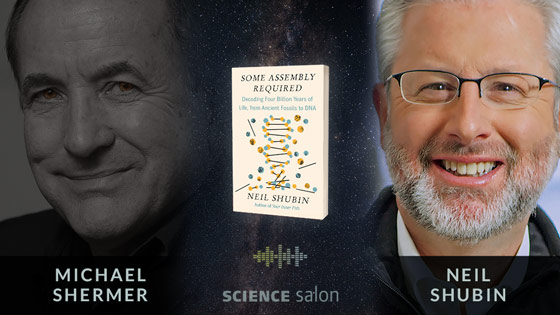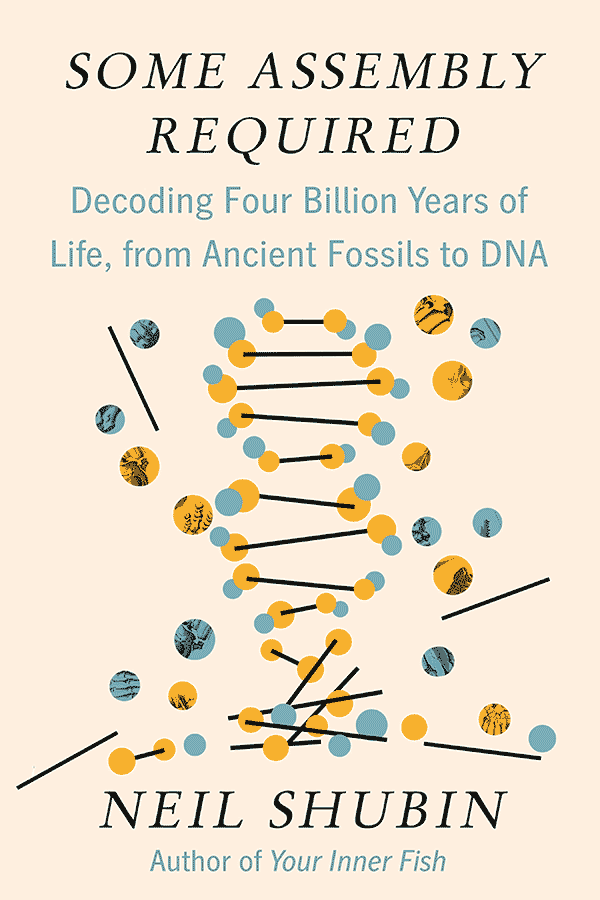SCIENCE SALON # 109
Michael Shermer with Neil Shubin — Some Assembly Required: Decoding Four Billion Years of Life, from Ancient Fossils to DNA
The author of the best-selling Your Inner Fish gives us a lively and accessible account of the great transformations in the history of life on Earth — a new view of the evolution of human and animal life that explains how the incredible diversity of life on our planet came to be. Over billions of years, ancient fish evolved to walk on land, reptiles transformed into birds that fly, and apelike primates evolved into humans that walk on two legs, talk, and write. For more than a century, paleontologists have traveled the globe to find fossils that show how such changes have happened. We have now arrived at a remarkable moment — prehistoric fossils coupled with new DNA technology have given us the tools to answer some of the basic questions of our existence: How do big changes in evolution happen? Is our presence on Earth the product of mere chance? This new science reveals a multibillion-year evolutionary history filled with twists and turns, trial and error, accident and invention. In Some Assembly Required, Neil Shubin takes readers on a journey of discovery spanning centuries, as explorers and scientists seek to understand the origins of life’s immense diversity. Shermer and Shubin also discuss:
- Darwin’s consilience of inductions (convergence of evidence) from multiple lines of inquiry
- how a scientific theory can gain acceptance without an underlying causal mechanism (evolutionary theory before DNA)
- what scientists should do with anomalies unexplained by the prevailing theory
- Does ontogeny recapitulate phylogeny? (What can we learn about evolution from embryology?)
- What is epigenetics, anyway?
- the best explanation for the origins of life
- how information can increase in a genome
- from microevolution to macroevolution: why creationists are wrong
- Are there hopeful monsters in evolution?
- Punctuated equilibrium and what it was like to be Steve Gould’s TA
- women in science, then and now
- What it’s like to do a paleontological dig north of the arctic circle? and
- Martian paleontology.
Neil Shubin is the author of Some Assembly Required, Your Inner Fish, and The Universe Within. He is the Robert R. Bensley Professor of Organismal Biology and Anatomy at the University of Chicago. He was elected to the National Academy of Sciences in 2011. He lives in Chicago.
Listen to the podcast via Apple Podcasts, Spotify, Google Podcasts, Stitcher, iHeartRadio, and TuneIn.
Check Us Out On YouTube.
Science Salon • Skeptic Presents • All Videos
You play a vital part in our commitment to promote science and reason. If you enjoy the Science Salon Podcast, please show your support by making a donation.
THE GREAT COURSES PLUS
Get unlimited access free for an entire month!
They say knowledge is power. Thanks to The Great Courses Plus we get to tap into this power with just a click. With this streaming service, unlock unlimited access to objective, reliable, fascinating information on virtually any subject. Learn from the brightest minds around the world, benefit from their years of experience and unique insight to help formulate our own knowledge and perspectives, so we can transform from a student into a master! With over 40 thousand 5-Star Reviews on The Great Courses Plus, you’re guaranteed to find compelling content.
Tap into this power of knowledge! Join me — and thousands of other learners — and sign up for The Great Courses Plus. For a limited time only, my listeners will get unlimited access completely free for an entire month! So don’t wait, sign up to start your Free Month Trial today. Simply use my special URL: thegreatcoursesplus.com/salon.
![The Fountain of Youth, 1546 painting by Lucas Cranach the Elder [https://en.wikipedia.org/wiki/The_Fountain_of_Youth_(Cranach)]](https://www.skeptic.com/eskeptic/2020/images/20-03-24/Lucas_Cranach_Der_Jungbrunnen.jpg)
A spring whose waters restore the youth of anyone who drinks or bathes in them is a myth that dates back to prehistoric times. Harriet Hall, M.D. reminds us that though many wines improve with age, human bodies don’t; we deteriorate.
The Fountain of Youth
& Other Anti‑Aging Myths
In St. Augustine, Florida, you can visit Ponce de León’s Fountain of Youth Archaeological Park for an admission fee of $18.00. There, you can drink a sample of the miraculous water. You might even feel a bit younger … but only if you believe and are suggestible … or perhaps are just thirsty. This fountain may be of historical interest, but it is not of any therapeutic value.
A spring whose waters restore the youth of anyone who drinks or bathes in them is a myth that dates back to prehistoric times. Herodotus wrote about it in the 5th century BC. The Spanish conquistador Ponce de León was the first European explorer to reach Florida. The King of Spain had authorized him to lead an expedition to search for “the Islands of Benimy” and he originally mistook Florida for an island. He was not searching for a fountain of youth; that myth wasn’t attached to his name until long after his death. But even if he had drunk of said fountain of youth, he’d still be dead.
Hope springs eternal, and history repeats itself. Today there are countless modern versions of the Fountain of Youth. Dietary supplements and other treatments are claimed to reverse the effects of aging and prolong life. Their promoters claim there is science behind them; in reality, they are just more myths. Centenarians share their secrets for a long life; they are all different. No treatment has ever been proven to keep humans young or make them live longer. Dr. Joe Schwarcz of McGill’s Office for Science and Society said it best: “the science is all wet and drips with crackpot notions.”
What Happens to Our Bodies as We Age?
Many wines improve with age, but human bodies don’t. We deteriorate with age. We develop wrinkles and gray hair, the skin thins and bruises more easily, vision and hearing decline and cataracts develop, blood pressure increases, bone density decreases, strength and agility decrease, the waist thickens, joints become arthritic, memory loss occurs, height may decrease by 1–2 inches, we learn and think more slowly, reaction time decreases, sexual functions change and hormone levels drop, and we become more likely to develop the diseases associated with old age such as cancer, diabetes, Alzheimer’s, and heart disease. Psychologically, it’s not all bad: the elderly have accumulated a vast store of life experience and general knowledge, sometimes but not always leading to wisdom. And believe it or not, older people tend to be happier.
As the World Health Organization explains, “At the biological level, ageing results from the impact of the accumulation of a wide variety of molecular and cellular damage over time. This leads to a gradual decrease in physical and mental capacity, a growing risk of disease, and ultimately, death.” Note the words “wide variety of molecular and cellular damage.” It is simplistic to think any single intervention could reverse all of those different damages. […]
SKEPTIC 25.1
Order the print edition, or download the digital edition today!
Who believes in conspiracies and why? Read real conspiracy theories and conspiracies with no theories in Skeptic magazine 25.1, available now in print and digital formats.
30-DAY FREE TRIAL : We offer a 30-day free trial to new digital subscribers on annual subscriptions within the Skeptic Magazine App for iOS and Android devices.












